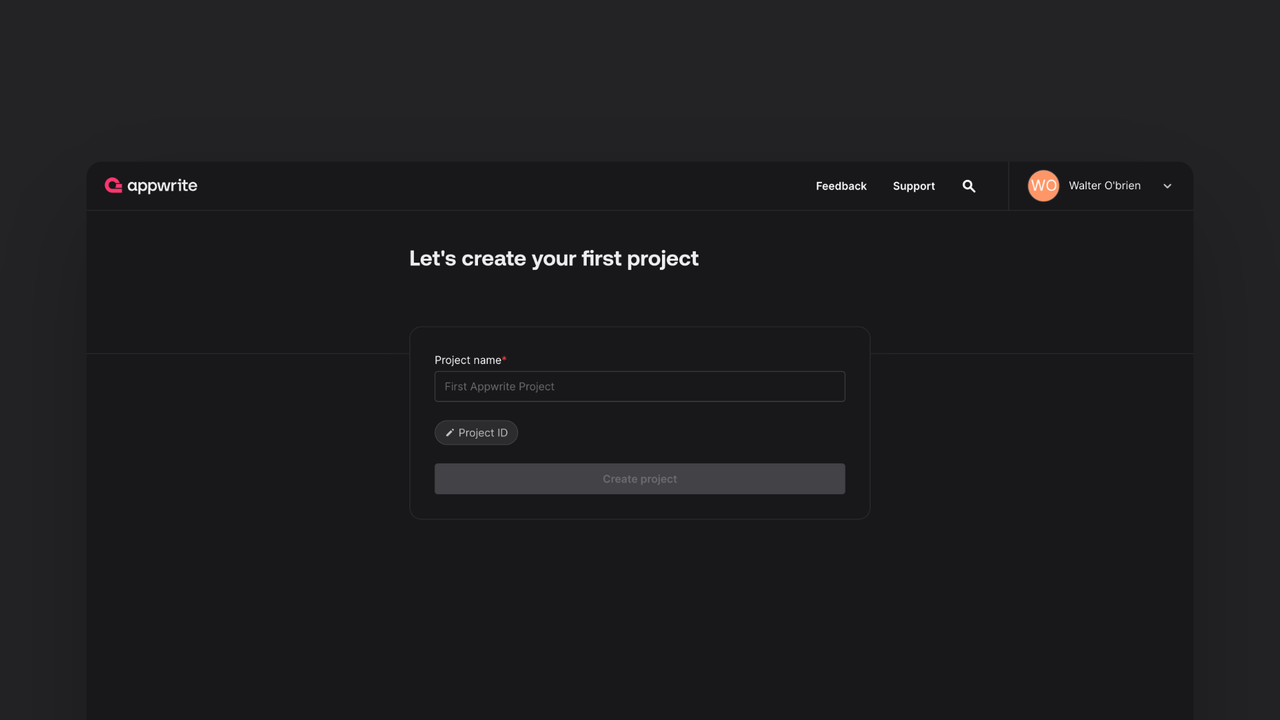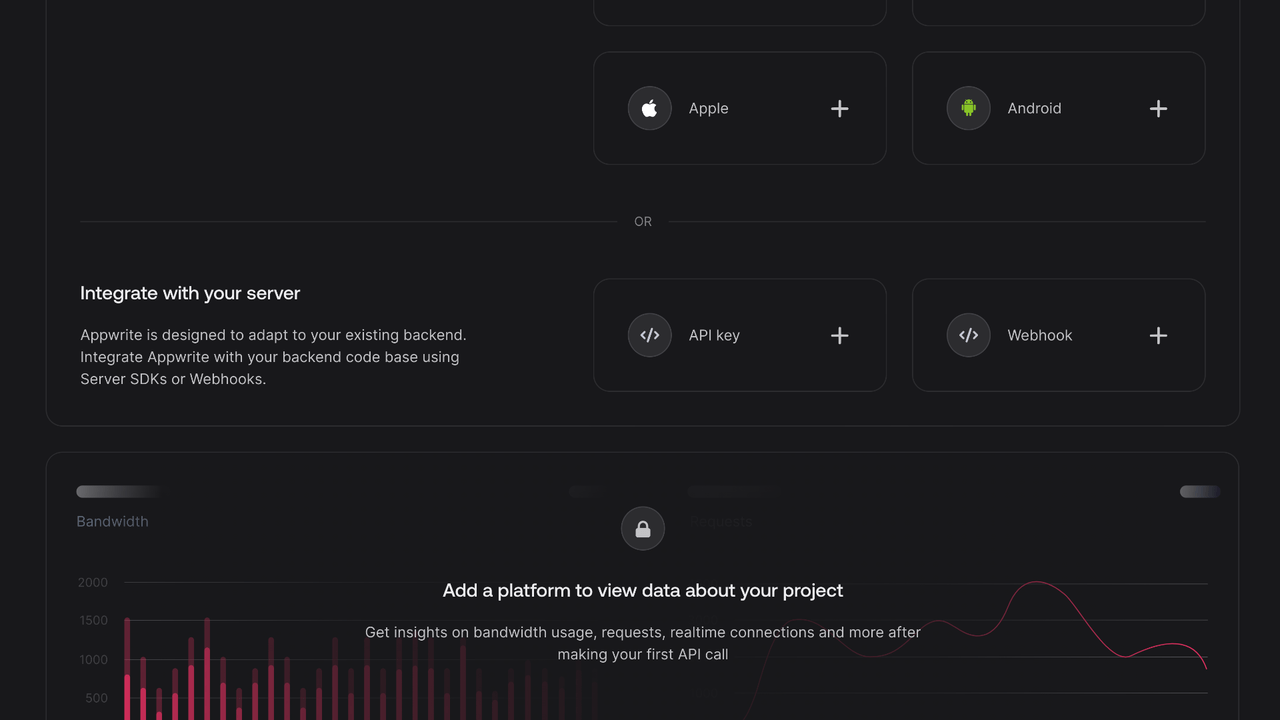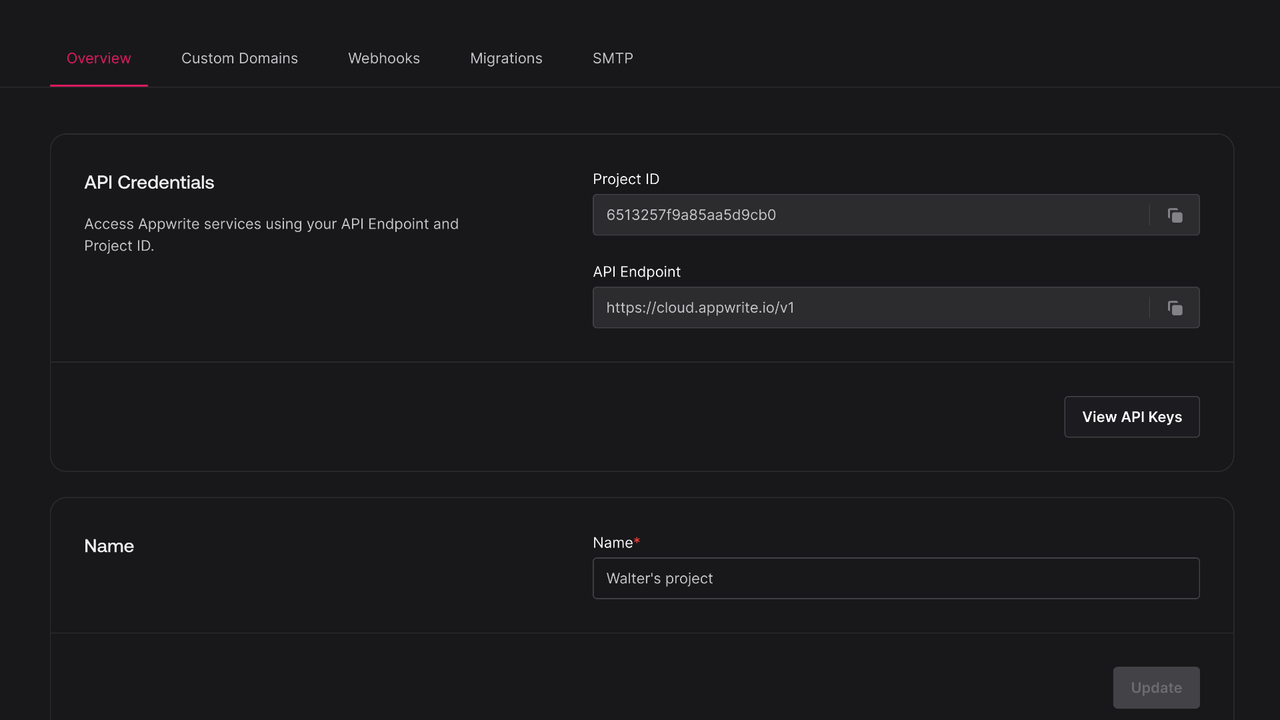Deno SDK Deprecation
The dedicated Deno SDK has been deprecated in favor of using the Node.js SDK directly through npm specifiers, thanks to Deno's excellent Node.js compatibility. This change simplifies maintenance and ensures you always have access to the latest features.
Learn how to setup your first Deno project powered by Appwrite.
Head to the Appwrite Console.
If this is your first time using Appwrite, create an account and create your first project.


Then, under Integrate with your server, add an API Key with the following scopes.


| Category | Required scopes | Purpose |
Database | databases.write | Allows API key to create, update, and delete databases. |
tables.write | Allows API key to create, update, and delete tables. | |
columns.write | Allows API key to create, update, and delete columns. | |
rows.read | Allows API key to read rows. | |
rows.write | Allows API key to create, update, and delete rows. |
Other scopes are optional.
Create a Deno CLI application.
mkdir my-app
cd my-app
echo "console.log('Hello, Deno!');" > mod.ts
Install the Appwrite SDK using npm specifiers at the top of your file.
// import all as sdk
import * as sdk from "npm:node-appwrite";
// import only what you need
import { Client, ... other imports } from "npm:node-appwrite";
Find your project ID in the Settings page. Also, click on the View API Keys button to find the API key that was created earlier.


Open mod.ts in your IDE and initialize the Appwrite Client. Replace <PROJECT_ID> with your project ID and <YOUR_API_KEY> with your API key.
import { Client, ID, TablesDB, Models } from "npm:node-appwrite";
const client: Client = new Client();
client
.setEndpoint("https://<REGION>.cloud.appwrite.io/v1")
.setProject("<PROJECT_ID>")
.setKey("<YOUR_API_KEY>");
Once the Appwrite Client is initialized, create a function to configure a todo table.
const tablesDB: TablesDB = new TablesDB(client);
var todoDatabase: Models.Database;
var todoTable: Models.Table;
interface Todo {
title: string;
description: string;
isComplete?: boolean;
}
async function prepareDatabase(): Promise<void> {
todoDatabase = await tablesDB.create({
databaseId: ID.unique(),
name: 'TodosDB'
});
todoTable = await tablesDB.createTable({
databaseId: todoDatabase.$id,
tableId: ID.unique(),
name: 'Todos'
});
await tablesDB.createStringColumn({
databaseId: todoDatabase.$id,
tableId: todoTable.$id,
key: 'title',
size: 255,
required: true
});
await tablesDB.createStringColumn({
databaseId: todoDatabase.$id,
tableId: todoTable.$id,
key: 'description',
size: 255,
required: false,
xdefault: 'This is a test description'
});
await tablesDB.createBooleanColumn({
databaseId: todoDatabase.$id,
tableId: todoTable.$id,
key: 'isComplete',
required: true
});
}
Create a function to add some mock data into your new table.
async function seedDatabase(): Promise<void> {
const testTodo1: Todo = {
title: 'Buy apples',
description: 'At least 2KGs',
isComplete: true
};
const testTodo2: Todo = {
title: 'Wash the apples',
isComplete: true
};
const testTodo3: Todo = {
title: 'Cut the apples',
description: 'Don\'t forget to pack them in a box',
isComplete: false
};
await tablesDB.createRow({
databaseId: todoDatabase.$id,
tableId: todoTable.$id,
rowId: ID.unique(),
data: testTodo1
});
await tablesDB.createRow({
databaseId: todoDatabase.$id,
tableId: todoTable.$id,
rowId: ID.unique(),
data: testTodo2
});
await tablesDB.createRow({
databaseId: todoDatabase.$id,
tableId: todoTable.$id,
rowId: ID.unique(),
data: testTodo3
});
}
Create a function to retrieve the mock todo data and a function to execute the requests in order. Run the functions to by calling runAllTasks();.
async function getTodos(): Promise<void> {
const todos = await tablesDB.listRows({
databaseId: todoDatabase.$id,
tableId: todoTable.$id
});
todos.rows.forEach((todo: Todo) => {
console.log(`Title: ${todo.title}\nDescription: ${todo.description}\nIs Todo Complete: ${todo.isComplete}\n\n`);
});
}
async function runAllTasks(): Promise<void> {
await prepareDatabase();
await seedDatabase();
await getTodos();
}
runAllTasks();
Run your project with deno mod.ts and view the response in your console.